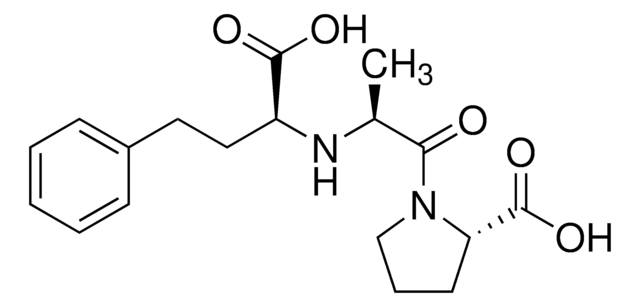E9658
Enalaprilat dihydrate
≥98% (HPLC)
Synonym(s):
(2S)-1-[(2S)-2-[[(1S)-1-Carboxy-3-phenyl-propyl]amino]propanoyl]pyrrolidine-2-carboxylic acid, Vasotec
About This Item
Recommended Products
Assay
≥98% (HPLC)
solubility
H2O: 14 mg/mL at 60 °C (warming for 5 minutes)
DMSO: 64 mg/mL
originator
Merck & Co., Inc., Kenilworth, NJ, U.S.
storage temp.
room temp
SMILES string
O.O.C[C@H](N[C@@H](CCc1ccccc1)C(O)=O)C(=O)N2CCC[C@H]2C(O)=O
InChI
1S/C18H24N2O5.2H2O/c1-12(16(21)20-11-5-8-15(20)18(24)25)19-14(17(22)23)10-9-13-6-3-2-4-7-13;;/h2-4,6-7,12,14-15,19H,5,8-11H2,1H3,(H,22,23)(H,24,25);2*1H2/t12-,14-,15-;;/m0../s1
InChI key
MZYVOFLIPYDBGD-MLZQUWKJSA-N
Gene Information
human ... ACE(1636)
Looking for similar products? Visit Product Comparison Guide
Biochem/physiol Actions
Features and Benefits
Storage Class Code
11 - Combustible Solids
WGK
WGK 3
Flash Point(F)
Not applicable
Flash Point(C)
Not applicable
Personal Protective Equipment
Certificates of Analysis (COA)
Search for Certificates of Analysis (COA) by entering the products Lot/Batch Number. Lot and Batch Numbers can be found on a product’s label following the words ‘Lot’ or ‘Batch’.
Already Own This Product?
Find documentation for the products that you have recently purchased in the Document Library.
Customers Also Viewed
Articles
We offer many products related to angiotensin receptors for your research needs.
Our team of scientists has experience in all areas of research including Life Science, Material Science, Chemical Synthesis, Chromatography, Analytical and many others.
Contact Technical Service








